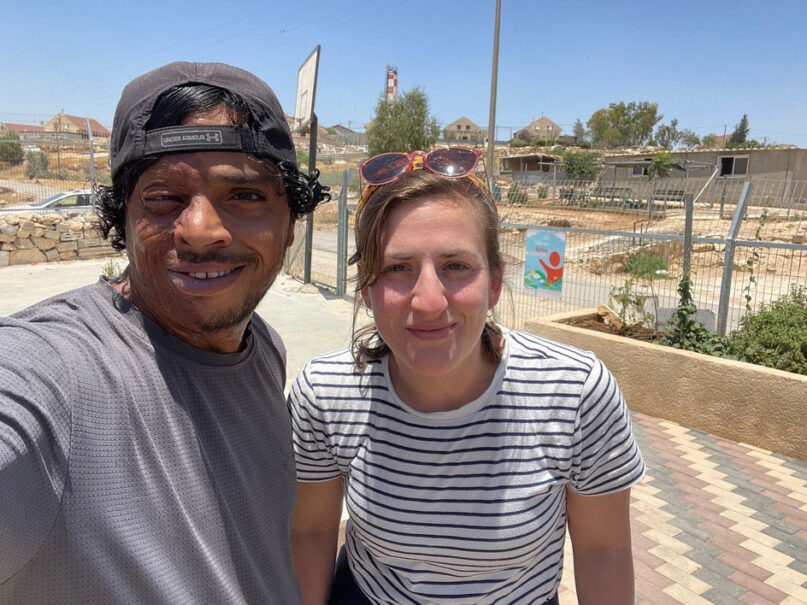(RNS) — Awdah Hathaleen had a hard time sleeping. Every time his phone vibrated at night, he said, his heart would begin to race. Are the settlers rampaging? Is another home getting demolished? Has anyone been hurt?
“The people are really suffering day and night,” he told an RNS reporter in May. “There is no safety at all. We wish we (could) sleep one night (and) be sure that nothing is going to happen. But we (haven’t) found that so far.”
On Monday (July 28), Hathaleen’s nightmares became a reality. The 31-year-old Palestinian Bedouin was shot and killed by a Jewish settler in his village of Umm al-Khair in the South Hebron Hills of the West Bank. Film shot at the scene showed the attacker opening fire.
Israeli authorities identified the suspect as Yinon Levi, a settler whom former President Joe Biden had previously sanctioned because of his involvement in expulsion and violence against Palestinians. President Donald Trump later lifted those sanctions.
Levi was detained on suspicion of “reckless conduct resulting in death and unlawful use of a firearm” but was later released to house arrest. He was to face a hearing on Tuesday, the Israeli-newspaper Haaretz reported.
News reports said the settler was driving an excavator and struck a resident of the village. Children gathered around the man who was struck unconscious and then began throwing stones. At that point, the assailant stepped down from the excavator and walked toward the village center brandishing a hand gun and shooting indiscriminately. Hathaleen was shot in the chest and died shortly afterward. The resident who was struck in the head by the excavator was later released from the hospital.
A well-known and beloved activist and a leader in his community’s nonviolent resistance, Hathaleen was mourned yesterday across the world by Muslims, Jews and Christians he had befriended over the past decade.
They described Hathaleen, an English teacher, as a warm and generous person who loved hosting people and building community and connections.
“He did so in the service of a higher purpose and a broader movement, and was really building the world he wanted to see for his children,” said Maya Rosen, a Jerusalem-based activist and journalist.
Basel Adra, a Palestinian activist and journalist and the protagonist of the Oscar-winning documentary “No Other Land,” said he was stunned by what he called the “slaughter” of “my dear friend.” Hathaleen had shot some of the video for the film.
“This is how Israel erases us — one life at a time,” he posted to X.
Hathaleen, like Adra, had cultivated a wide network of allies committed to the survival of Palestinians amid ongoing assaults by Israel. Over the past decade Hathaleen became especially close with some Israelis and American Jewish activists who volunteered as a “protective presence,” teams intended to deter settler violence and land grabs and document human rights violations.
He told RNS in May: “I’m a Palestinian, but forget it, put it aside. As a human, do you accept what I’m facing? Anyone who is a human will say ‘no.’”
The following month, Hathaleen and his cousin, Eid Sueliman Hathaleen, flew to the U.S. for a series of talks with Jewish and Christian congregations. But U.S. Customs and Border Protection revoked their visas at San Francisco International Airport and they were put on a plane back home the following day.
RELATED: Palestinians invited to speak at a Bay Area synagogue were sent home at airport
Ever since the Oct. 7, 2023, Hamas attack on Israel, life for West Bank Palestinians has become increasingly precarious. Israeli forces and settlers have killed nearly 1,000 people in the West Bank since that day, according to the U.N. At least 2,907 home demolitions have been carried out by Israel during the same period.
Hathaleen’s village, Umm al-Khair, is part of Masafer Yatta, a collection of 19 hamlets. The Bedouin Palestinians living there, most of them shepherds, have been denied access to their grazing lands by encroaching settlers. Hathaleen counted 118 structures in his village that have been destroyed since 2007.
But the daily terrorizing of its residents by settlers has only intensified.

Awdah Hathaleen with Elisheva Goldberg in the village of Umm al-Khair in 2024. Photo courtesy of Elisheva Goldberg
Elisheva Goldberg, a friend of Hathaleen’s for more than a decade and now senior director of media and policy for the New Israel Fund, said she was struck by how increasingly frightened Hathaleen had become over the past two years.
“I’d never seen him so afraid,” Goldberg said. “This is a guy who believed very strongly in nonviolent resistance to the occupation, in standing his ground, believing that existence is resistance,” Goldberg said. “What happened yesterday murders that idea.”
Rabbi David Cooper, the retired rabbi of Kehilla Community Synagogue in Piedmont, California, saw Hathaleen’s growing fears, too. The rabbi had befriended Hathaleen on a 2017 trip to Israel and returned several times to visit. His synagogue had invited the Hathaleen cousins to speak to congregants in June.
“He didn’t know how he could possibly say to his kids that everything was gonna be OK,” Cooper said of Hathaleen, a father of three. “And I thought, oh my God, for a parent not to be able to reassure your children that things will be fine. To me that is one of the worst aspects of trying to be a parent in an occupation, especially one that was getting worse and worse.”
A funeral for Hathaleen has not taken place and the Israeli army has not yet released his body to his family. Activists who visited the village after the shooting said a mourning tent was taken down by the military and the village was declared a closed military zone.
Activists said they did not hold much hope that Israel will hold Hathaleen’s killer to account. The Israeli human rights group Yesh Din’s monitoring found that between the years of 2005 and 2024, only 3% of investigations into what they descruibed as “ideologically motivated crime” against Palestinians in the West Bank led to a full or partial conviction.
The Israeli military did not respond to a request for comment.
RELATED: A group of observant Jews set out to reclaim their tradition’s focus on justice, mercy amid Gaza war



